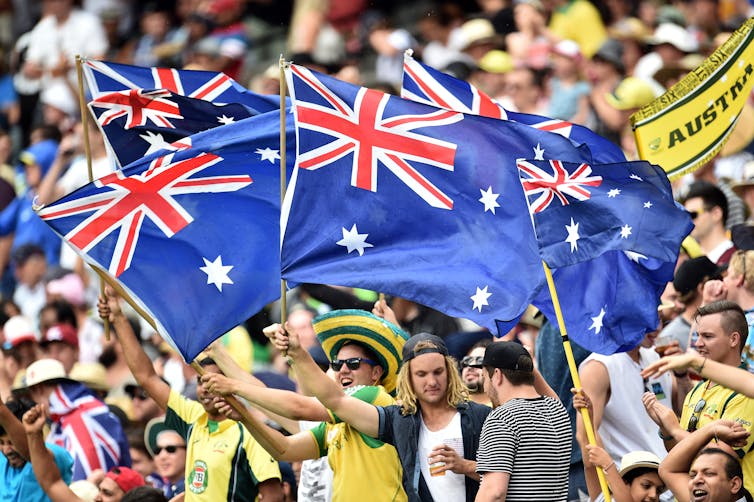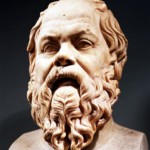Colin Tatz, Australian National
Australians may well love their sport, but why don’t we delight in success elsewhere?

AAP/Julian Smith
University
Patriotism is well and good, but nationalism is something else. It is exaltation of the nation above all, the feeling of superiority over others – sometimes with sufficient warrant, often without. It is “something above” – real or imagined, like a nation, an emperor, a people – to kill and die for.
The Australian nation and nationalism, we often proclaim, began at Gallipoli. This is a nonsense, as that sets aside the previous 129 years of (white) history as nothing. But it’s a good story and it explains a key component of the warrior nation: tough, rugged, aggressive, competitive, resilient, essentially manly and matey.
We boast of our warrior participation in every major war since 1899, and in every modern Olympics since 1896.
Since 1941, the Australian War Memorial has commemorated sacrifice, but in the end it tends to convey the glory of war rather than any abhorrence of it.
The National Sports Museum at the MCG celebrates our 1936 athletes in Berlin, with glass cases of spikes and similar iconic triumphs (one bronze medal) alongside a welcoming photograph of Herman Göring, Hitler’s deputy. The museum displays athleticism and omits the context of the ghastliness of what was happening to people at that time.
We were sprouting “politics and sport don’t mix” even as that mix was being celebrated by so many nations.
Why the overemphasis on manly, sporting prowess?
Australia has 16 Nobel Laureates and several Man Booker prizewinners for literature. Accolades abound for our symphony orchestras and musical ensembles, for our rock, pop, country, and jazz performers.
So why do we delight so much less in those domains? This is even stranger when you consider these activities are classical, while sport is here for the moment and gone in a few seconds, minutes, hours or days.
Sport is ephemeral, transient. It is an eternal social institution, always there. But individual sporting events that make up that institution are here for a moment.
The quintessential ingredient of competitive sport is that the result is unknown until the final whistle. It is the uncertainty of outcome, the hope and expectation, that makes individual events so eagerly awaited, watched, leaving elation or despair for the fan.
Yes, there are record books and statistics, pored over by aficionados. But game over, we await the next one, close to forgetting the earlier results.
Great literature, art, and music are classical – that is, they are an exemplary standard, achievements commanding enduring respect. We gape at Leonardo forever, re-read the Dickens genius, listen repeatedly to Sibelius’ violin concerto, to jazz man Sydney Bechet on soprano sax, or the musicality of AC/DC. Each viewing or hearing gets better.
Sport is utterly different: once you know the result, any re-look on screen is merely to watch an exhibition of athleticism. You see Usain Bolt win once, twice perhaps, once more for temporary good measure – and that’s enough.
Does sport really warrant its place?
As a sports critic and sports historian I have learned that while sport is a good common denominator for social talk and engagement, a huge slice of the national population never watches, reads or talks about it.
Australia won 16 gold medals at the Sydney 2000 Olympics. That was something to talk about for a few weeks. We won eight in Rio in 2016, half as much to boast about.
But where are we now? Achievements, especially the glorious ones, need context. To win is sweet, but who are the opponents? Some ten countries are in cricket and in top-level rugby union, six in rugby league, there are but ten in field hockey and 16 in netball, and a mere one, us, in Australian rules football.
In the smaller worlds of sport, the Wallabies are bewitched and bewildered. Our cricket is in an ashtray of its own making at present. Rugby league is beset by problems with cash and hash.
In the larger arenas of world sports, we struggle mightily in the lower tiers of round-ball football. We have lost our swimming mojo. We depend on Sally Pearson at every athletics meet; enjoy vicarious basketball through Patty Mills in the NBA.
We lost our love of or liking for boxing a long time ago, and tire of watching tired middle-aged middleweights fighting each other, yet again.
Our male tennis players display high levels of brattery. And so we wound up waxing hysterical over every Jarryd Hayne move (or stuttering move) in that utterly foreign sport, gridiron.
Defining ourselves as a nation
So, the question becomes: how do we define ourselves as a nation?
As progressive, liberal-minded democrats, and good colonists? No. We are so very much more conservative than progressive.
As a cultured and civilised society? You’ll have to ask the Aborigines, immigrants, refugees, the homeless, the indigent, the aged and those on the poverty line about that.
As warriors? Yes, and yes again.
“ANZACkery” insists that we were only born out of the crucible of war at the start of the 20th century, and Olympism tells us that we “punch above our weight” compared to other nations, or we want to be seen that way.
![]() We also spend untold millions in an effort to keep it that way, even if only for a transient moment. Oi, oi, oi.
We also spend untold millions in an effort to keep it that way, even if only for a transient moment. Oi, oi, oi.
Colin Tatz, ANU Visiting Professor, Politics and International Relations, Australian National University
This article was originally published on The Conversation. Read the original article.

Leave a Reply